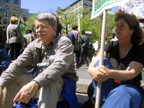Here in the purported paragon of electoral democracy, the United States of America, we have now suffered through presidential elections in 2000 and 2004 that were widely regarded as questionable. I am referring of course to the fiasco’s of Florida in 2000 and Ohio in 2004.
Even before the Supreme Court made Bush President by a vote of 5 to 4, the state government in Florida went out of its way to keep African-Americans from voting by vetting the registrations for “felons.”
According to Greg Palast, “in the 2004 presidential race, the GOP ran a massive, multi-state, multimillion-dollar operation to challenge the legitimacy of black, Hispanic and Native American voters.” Palast now says that a similar effort will be made in 2008 if the Voting Rights Act is allowed to expire in 2007.
Elections in the USA are now, and have been for decades, dominated by big money interests. Politicians, even in small states like Vermont, must raise hundreds of thousands, sometimes even millions, of dollars just to be competitive. The overwhelming majority of that money comes from corporations and wealthy individuals. Labor unions and average voters run a poor second and third in the money marathon.
The two major parties have so gerrymandered electoral districts that, in the upcoming 2006 congressional races, for example, only 20 or 30 of more than 400 seats in the House of Representatives are considered in play. A Wall Street Journal article pointed out that “in Michigan, which Al Gore carried by five percentage points, a GOP gerrymander has stuffed six Democratic incumbents into only three seats. The likely result is that a nine-to-seven Democratic majority delegation will become a nine-to-six GOP majority. In a burst of candor, one of the stuffed Democrats, Representative Jim Barcia, admitted that ‘If the shoe were on the other foot, we would be doing the same thing.'”
The Electoral College, a medieval remnant, awards extra votes in presidential elections to states with few voters but lots of space for jack rabbits. It also distorts elections by creating just a few “battleground states,” leaving the majority of voters, mostly in large states like New York and California, ignored and virtually disenfranchised.
Electronic voting machines are being deployed across the US which have no paper trail to back up their software compiled tallies of votes, leading to fears of massive vote hacking by corrupt electoral officials.
If all this isn’t enough, with a few exceptions, all US elections are “winner take all,” meaning that, even with the abysmally low turnouts in most races, the political party that gets the most votes gets everything, creating the dreaded “lesser evil effect.”
This LEE syndrome, once it has infected normally sane anti war voters, for example, leads them to vote for a pro-war candidate, rather than a genuine anti-war candidate, so as not to be accused of paving the way for the worst evil, someone like George W. Bush for example. Proportional representation, which would mitigate this syndrome, has yet to find much traction in the US, outside a few havens of liberalism like San Francisco.
As a result of all these factors, there already is a de facto boycott of elections in the US. It is called “low voter turnout.” Many workers, after having tried voting a couple of times, only to see no changes, or only a change for the worse, have concluded that the system is rigged, and stopped voting in a completely understandable reaction to having been fooled once too often.
The question now for anti-war activists, leftists, socialists, etc. is this: do we begin an active campaign for an election boycott in the US, in order to delegitimize a system more and more out of control of the people? Can we make an international scandal of the corrupt process we call an election here in the USA?
The US government doesn’t hesitate to use this tactic against popular leaders like Hugo Chavez, no matter how many internationally recognized elections he wins.* Why shouldn’t this table be turned against it, when the evidence against its electoral system is so strong?
* In 2005, the Bush administration supported the opposition parties in boycotting the legislative elections in Venezuela, claiming that the elections were fraudulent. Venezuelan National Assembly Speaker Nicolas Maduro said the US embassy was working with opposition groupings to encourage abstention and scepticism about the neutrality of the election board.
 Jon Flanders is a member and former president of IAM LL 1145 and a member of the Troy Area Labor Council, AFL-CIO.
Jon Flanders is a member and former president of IAM LL 1145 and a member of the Troy Area Labor Council, AFL-CIO.
